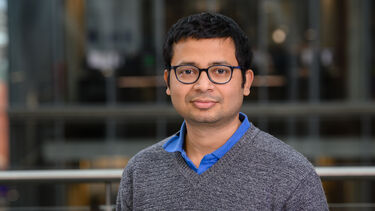Dr Swagato Sanyal recently joined the School of Computer Science, so we asked some questions to get to know him a bit more:
What are your key areas of research?
SS: I work in theoretical computer science in general and computational complexity theory in particular. More specifically, I work on the analysis of Boolean functions, query, and communication complexity.
Did something in particular draw you to this research field?
Why did you want to pursue a career in academia and, in particular, in Computer Science?
SS: I wanted to keep academic research at the centre of my profession. I pursued a career in academia because of its flexible working hours, the independence it offers in terms of choosing research questions, and the opportunity it provides to interact and work with students.
What is your favourite thing about teaching the next generation of computer scientists?
What attracted you to working at The University of Sheffield?
SS: The University of Sheffield is a reputed Russell Group university of the UK. It has a wonderful research environment as reflected by its REF 2021 ranking. Several schools, including the School of Computer Science, has an Athena Swan silver status, underscoring the commitment of the school and the university towards the preservation and advancement of a gender-diverse and inclusive workplace culture. The “Foundations of Computation” group of the School of Computer Science involves academic and research staff members working in Algorithms, Computational Complexity, Combinatorics, Logic, Program Semantics and Verification, etc, and is one of the strongest and most diverse groups of its kind in all of the UK.
And finally, do you have any hobbies or interests that you would like to share?
SS: Reading. Both fiction and non-fiction. I am fond of historical accounts and science fiction. I also like biographies that depict a certain time and society with a personality at the centre.

